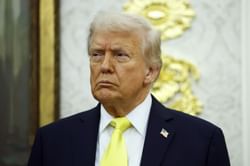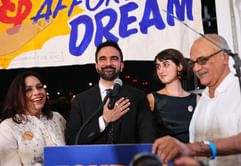
Leonardo Wilhelm DiCaprio was born on November 11, 1974 in Los Angeles, California.
Leonardo DiCaprio is the lone child of George DiCaprio, a writer, publisher, and distributor of comic books, and Irmelin DiCaprio, a legal secretary. They met in college and then moved to Los Angeles. His father is of German and Italian ancestry, while his maternal ancestry is Russo-German.
DiCaprio has stated that as a young child, he considered either becoming a marine biologist or an actor, but ultimately decided on the latter because he enjoyed playing characters and people and seeing how others reacted to his acting. When he was two years old, at a performance festival, he spontaneously danced on stage, and the audience applauded, sparking his interest in performing. His stepbrother Farrar's appearance in a television commercial, for which Farrar received $50,000, also inspired him to pursue acting.
DiCaprio has stated in interviews that he made his television debut on the children's show “Romper Room” and was fired for being disruptive. The host of the program, however, has refuted claims that any children were banned from the program in this manner.
When he was fourteen, he started appearing in commercials, including one for Mattel's Matchbox cars, which he considers to be his first role. Later, he made an appearance in ads for Apple Jacks, Bubble Yum, and Kraft Singles. He portrayed Glen in two episodes of the television show “The New Lassie” in 1989.
How was Leonardo DiCaprio’s earlier work?
In the low-budget horror movie “Critters 3” in 1991, where he made his acting debut, DiCaprio played the stepson of a dishonest landlord. He later referred to the role as "your average, no-depth, standard kid with blond hair."
When asked why he prefers not to remember "Critters 3," DiCaprio described it as "possibly one of the worst films of all time" and cited it as the kind of role he intends to avoid going forward. Later in 1991, he joined the recurring cast of “Growing Pains” as Luke Brower, a homeless child adopted by a family.
DiCaprio was "especially intelligent and disarming for his age," according to co-star Joanna Kerns, but she also recalled him as being mischievous and jovial on set and frequently making fun of his co-stars.

DiCaprio left the show before it finished airing, attributing his departure to poor writing, despite. In the category of "Best Young Actor Co-starring in a Television Series," he was nominated for a Young Artist Award. In another episode of “Roseanne” that year, DiCaprio had an uncredited role.
In 1992, Leonardo DiCaprio had a small part in the first “Poison Ivy” movie. Later that year, Robert De Niro personally chose Leonardo DiCaprio from a shortlist of 400 young actors to star alongside him in “This Boy's Life.” The movie is a biopic about the bond between Tobias "Toby" Wolff, played by Leonardo DiCaprio, and his controlling stepfather and mother.
DiCaprio's lack of set manners, according to the film's director, Michael Caton-Jones, forced him to adopt a strict mentoring approach, which caused DiCaprio's behavior to start to improve. According to Bilge Ebiri of Rolling Stone, DiCaprio's portrayal of the character's complex development from a rebellious teen to an independent young man elevated the movie thanks to their strong chemistry.

How did Leonardo DiCaprio become successful?
He was cast as the lead in the 1993 biopic "This Boy's Life," for which he won wide acclaim. Leonardo received an Academy Award nomination for best supporting actor for his subsequent film, "What's Eating Gilbert Grape?". Additionally, DiCaprio received praise for his roles in the gripping dramas "Total Eclipse" and "The Basketball Diaries." William Shakespeare's "Romeo + Juliet," which grossed $147.5 million worldwide in 1996, starred Leonardo DiCaprio.
The 1997 James Cameron-directed movie "Titanic" followed this success. In the end, "Titanic" broke all box office records, won numerous accolades, and cemented DiCaprio's status as a leading man. Moving forward, DiCaprio appeared in a number of lucrative motion pictures, such as the $352 million worldwide grossing "Catch Me if You Can," directed by Steven Spielberg; "Inception," by Christopher Nolan; and the Academy Award-winning "Revolutionary Road."
In addition to "Gangs of New York," which made $193.7 million worldwide, "The Aviator," which made $211.7 million worldwide, "The Departed," which made $289 million worldwide, "Shutter Island," which made 294.8 million, and "The Wolf of Wall Street," which made 392 million, he has starred in several movies made by the renowned Martin Scorsese.
Additionally, DiCaprio has appeared in the movies J. Edgar, Django Unchained, The Great Gatsby, and The Revenant. Among the movies DiCaprio produced were "The Aviator," "Orphan," "Runner Runner," and "The Wolf of Wall Street."

He won an Academy Award in 2016 for "The Revenant." while for his roles in "The Aviator," "The Wolf of Wall Street," and "The Revenant," he received Golden Globe Awards for Best Actor. The Martin Scorsese movie "Roosevelt" had Leonardo DiCaprio playing the lead role when it was announced in 2017. Leonardo made $30 million from the 2021 Netflix film “Don't Look Up.”
How much did Leonardo DiCaprio earn?
The $1 million Leo made for 1995's "The Basketball Diaries" was his largest early salary. For "Titanic," Leonardo received a base pay of $2.5 million. A 1.8% backend point share of gross revenue was also wisely negotiated by him. Leo earned a total of $40 million from "Titanic" after it amassed a $3 billion global box office, DVD, and syndication haul.
Leo was able to command $20 million for the 2000 film "The Beach" thanks to the success of "Titanic." He earned $10,000,000 for "Gangs of New York." The following films made $20 million each—"Catch Me If You Can," "The Aviator," "The Departed," and "Blood Diamond."
Leo again negotiated gross percentage points for the 2010 film "Inception," enabling him to make just under $60 million. Leonardo made at least $300 million in box office salaries and bonuses between 1995 and 2020. He and Brad Pitt each received $10 million for their roles in Quentin Tarantino's 2019 Charles Manson movie, "Once Upon A Time In Hollywood."



